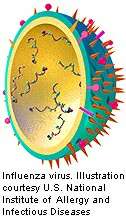Naturally occurring cross-protective T-cell immunity may protect against disease in polymerase chain reaction-confirmed influenza, according to a study published online April 6 in the American Journal of Respiratory and Critical Care Medicine.
(HealthDay)—Naturally occurring cross-protective T-cell immunity may protect against disease in polymerase chain reaction (PCR)-confirmed influenza, according to a study published online April 6 in the American Journal of Respiratory and Critical Care Medicine.
Andrew C. Hayward, M.D., from the Farr Institute of Health Informatics Research in London, and colleagues examined whether naturally occurring T-cell responses targeting highly conserved internal influenza proteins could provide cross-protective immunity against pandemic and seasonal influenza. Influenza A (H3N2) virus-specific T cells were quantified in a population cohort between 2006 and 2010. Baseline T-cell measurements were identified for 1,414 unvaccinated individuals (1,703 participant observation sets).
The researchers found that T-cell responses to A(H3N2) virus nucleoprotein (NP) dominated. In participants lacking antibody to A(H1N1)pdm09, T-cell responses to A(H2N3) virus NP strongly cross-reacted with A(H1N1)pdm09 NP (P < 0.001). Fourteen percent of paired pre- and post-season sera (1,431 sets) exhibited evidence of infection based on four-fold increases in influenza antibody titer. There was a correlation between the presence of NP-specific T cells before exposure to virus and less symptomatic PCR-positive influenza A (overall adjusted odds ratio, 0.27; P = 0.005). Protection was found to be independent of baseline antibodies. In 43 percent of the population, influenza-specific T-cell responses were detected.
"Naturally occurring cross-protective T cell immunity protects against symptomatic PCR-confirmed disease in those with evidence of infection and helps to explain why many infections do not cause symptoms," the authors write.
More information: Full Text (subscription or payment may be required)
Journal information: American Journal of Respiratory and Critical Care Medicine
Copyright © 2015 HealthDay. All rights reserved.




















